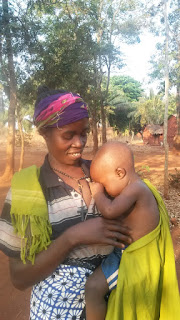 In August I spent a week in Zeze village and met the chair, vice chair and secretary of the microfinance group,
as well as many of the women who have received loans.
In August I spent a week in Zeze village and met the chair, vice chair and secretary of the microfinance group,
as well as many of the women who have received loans. I also visited many of them in their homes and businesses and spoke to the Village Chairman, Village Executive Officer, and chair of MVG, who are running the scheme who all confirmed the positive impact the scheme is having on the village.

Petronia had her loan in May, thanks to a new injection of funds from Wabia. She buys palm oil from farmers
in the fields and resells it in the market, making approx. £8 profit per
week. Recently her 8 month baby started
excreting blood and she was able to take her to the doctors and buy medicine. Without her business she said she would have
been unable to do that.
 Pendo buys petrol in
large containers and decants it into litre bottles which she sells in the
market and on the road. Her profits mean
that she is able to pay for her son, who was unemployed, to study to be a
mechanic.
Pendo buys petrol in
large containers and decants it into litre bottles which she sells in the
market and on the road. Her profits mean
that she is able to pay for her son, who was unemployed, to study to be a
mechanic.
Edita received her loan
last month. She is making bible covers
for 80p that she sells for £1 in Kasulu, the town 40 km away that she
visits twice a week. She had sold 40 to
a shop there the previous day. She is
saving to purchase a second sewing machine so her husband can also make them at
the same time. She also wants to branch
into mpesa (mobile money)
Josrene had an
initial £18 loan which she repaid, then a £50 loan in May. She collects maize and beans from farmers in
the field and then grinds flour and then sells in bulk to buyers from
Kigoma. She is saving to build a bigger house for her
family with larger storage capacities as she wants to sell wholesale directly in Kigoma in the future.
 Godliva had a second
loan in June. She also sells beans and
maize, but also soap. She gets a profit of 80p per box for
this. She is saving money to get a soap
factory so she can make her own soap. This would cost £120 but she estimates it
would bring her "20 a week profit.
Godliva had a second
loan in June. She also sells beans and
maize, but also soap. She gets a profit of 80p per box for
this. She is saving money to get a soap
factory so she can make her own soap. This would cost £120 but she estimates it
would bring her "20 a week profit. What was generally striking was the pride with which the
women talked about their businesses. They
have noticeably grown in confidence since I met them in January, and have a
higher status in their family and in the village as a whole. Originally I was
told that there was resistance from some men in the village, concerned that
women getting loans would be a threat to their authority.
What was generally striking was the pride with which the
women talked about their businesses. They
have noticeably grown in confidence since I met them in January, and have a
higher status in their family and in the village as a whole. Originally I was
told that there was resistance from some men in the village, concerned that
women getting loans would be a threat to their authority. Now the same men ask Benedicto when their wives can get a loan. It was touching to see a number of the women working closely with their husbands as partners in the business, whereas previously they worked much more separately. This appears to have had a positive effect on their relationships, which was confirmed by the women themselves. In the training women were told “Don’t use your loan to exploit your husband, rather money should be a tool for strengthening the love in your family”. They seem to have taken this to heart!


